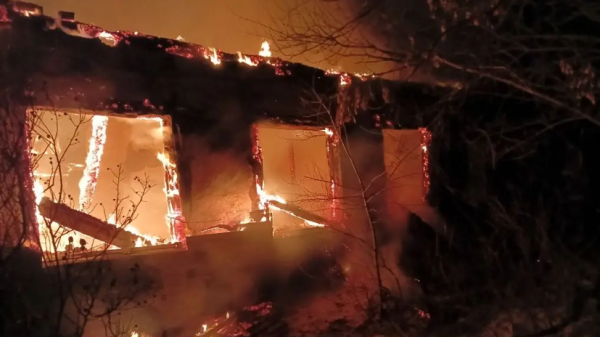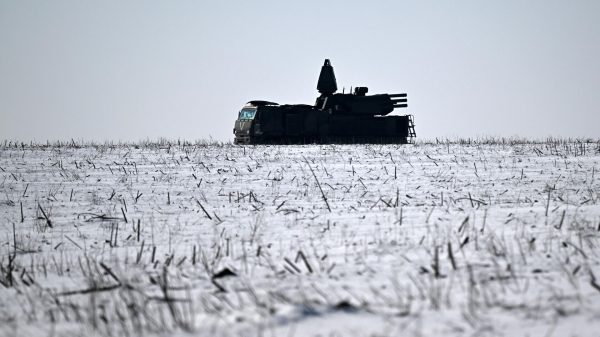Donald Trump has announced on Twitter that he wants to bring all US troops home from Afghanistan by Christmas – a plan that puts complicated peace negotiations in jeopardy.
The announcement was greeted enthusiastically by the Taliban on Thursday. If Trump follows through, the militant group would almost certainly claim it as a victory, after decades of couching their fight as a war against foreign aggression.
“It’s no surprise that the Taliban have welcomed Trump’s announcement that he’d have the troops home by Christmas. They spent 19 years fighting for this,” said Ashley Jackson, the director of the ODI’s Centre for the Study of Armed Groups.
“This is the last leverage the US had left in talks with the Taliban, and Trump is proposing to give it away for free.”
US military increasingly using drone missile with flying blades in Syria
Read more
Without the prospect of US military pressure, the Taliban would have little incentive to stay at the negotiating table with representatives of the Kabul government.
Trump has made impulsive policy announcements about Afghanistan on Twitter before, including calling off a US-Taliban summit last year, shortly before a withdrawal agreement was first expected to be signed.
He also has a record of ordering abrupt and total troop withdrawals from foreign deployments. In most cases the Pentagon has sought to mitigate and slow the speed of the pullout but the president has largely prevailed in bringing soldiers back home.
The Afghan government and Taliban negotiators are currently attempting to hammer out a new political settlement for the country in the Qatari capital. The peace talks were set up under a withdrawal agreement signed earlier this year between the Taliban and Trump’s administration.
The US-Taliban deal laid out a full departure of American forces by May 2021 but only if conditions on counter-terrorism were met, including severing ties with al-Qaida. Some critics of the Doha talks argue that the militants have little interest in peace and are merely marking time until the departure of US troops.
Trump’s plans were announced in a tweet late on Wednesday night. The White House doubled down on the message on Thursday morning: “our troops in Afghanistan are coming home by the end of the year”, the official Twitter account for the administration said.
It was the latest in a long line of ad hoc policy announcements from Trump that have caught his own advisers and military by surprise. His national security adviser, Robert O’Brien, had said shortly before Trump tweeted that troop numbers would be brought down to 2,500 early next year.
About 4,500 troops are currently on the ground in Afghanistan, reduced from over 12,000 when the deal was signed in February.
A senior US officer when asked about the prospect of a complete withdrawal by Christmas, fell silent for a moment before saying, “Oh my God!”, the New York Times reported. The Pentagon referred all requests for comment on Afghanistan drawdown plans to the White House.
The Taliban welcomed Trump’s remarks as “a positive step towards the implementation of [the] Doha agreement”, a spokesman for the Islamist group, Mohammad Naeem, said in a statement, referring to the US withdrawal deal.
Peace talks have been progressing slowly, with negotiators still trying to lay out the ground rules for their discussion. They are currently stalled on which school of Islam should be used when settling disputes.
Trump has made a promise to “end” America’s wars overseas part of his bid for re-election this year, promising to bring troops home from a constellation of conflict zones including Iraq, Syria and Afghanistan.
But past pledges to bring back troops have often been abandoned, reversed or only partially completed.
After ordering a total withdrawal of US troops from Syria in October 2019, Trump was persuaded to let some stay on the grounds that they would protect oil installations there, a mission that appealed to him
A US military presence has remained, but it is about half the size of the thousand-strong force that was supporting Kurdish forces in northern Syria.
In July, the Pentagon announced it was pulling nearly 12,000 troops out of Germany, after Trump called for a total withdrawal as punishment of the Berlin government for policy disagreements.
However, senior military officials made clear it would take years to redeploy that number of troops. The drawdown of foreign deployed forces was dwarfed by the dispatch of 10,000 US troops to the Gulf following the killing of the Iranian general Qassem Suleimani in January.
That troop surge is now being gradually drawn down as the perceived threat has receded. US military observers have suggested that the Pentagon would seek to slow-roll the president’s orders of drastic withdrawal pending the outcome of the 3 November elections.






















































Свежие комментарии